八年级英语下册:Unit3-Could-you-please-clean-your-room教案
- 格式:doc
- 大小:108.00 KB
- 文档页数:19
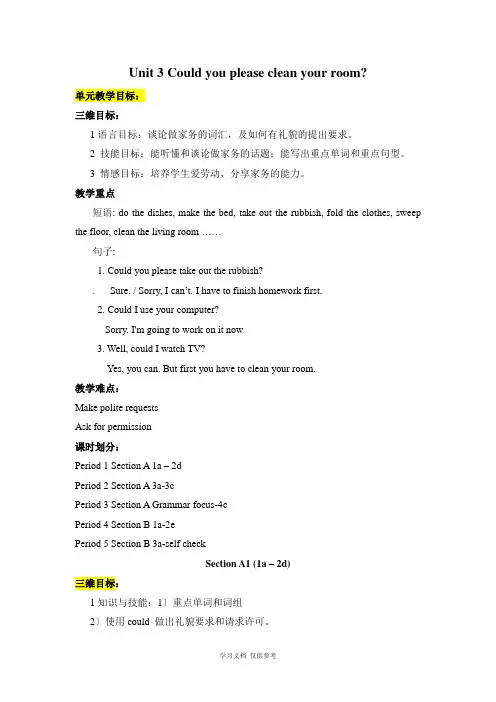
Unit 3 Could you please clean your room?单元教学目标:三维目标:1语言目标:谈论做家务的词汇,及如何有礼貌的提出要求。
2 技能目标:能听懂和谈论做家务的话题;能写出重点单词和重点句型。
3 情感目标:培养学生爱劳动,分享家务的能力。
教学重点短语: do the dishes, make the bed, take out the rubbish, fold the clothes, sweep the floor, clean the living room ……句子:1. Could you please take out the rubbish?. Sure. / Sorry, I can’t. I have to finish homework first.2. Could I use your computer?Sorry. I'm going to work on it now.3. Well, could I watch TV?Yes, you can. But first you have to clean your room.教学难点:Make polite requestsAsk for permission课时划分:Period 1 Section A 1a – 2dPeriod 2 Section A 3a-3cPeriod 3 Section A Grammar focus-4cPeriod 4 Section B 1a-2ePeriod 5 Section B 3a-self checkSection A1 (1a – 2d)三维目标:1知识与技能:1〕重点单词和词组2〕使用could 做出礼貌要求和请求许可。
2.过程与方法:通过合作探究的方法结局本课的重点知识点3.情感态度与价值:学会照顾自己,培养自己的独立意识。
教学重点:谈论做家务的词汇,情态动词could的使用方法。
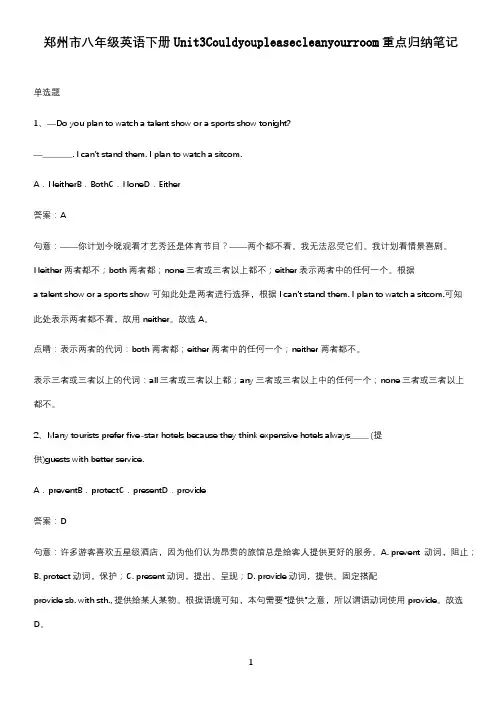
郑州市八年级英语下册Unit3Couldyoupleasecleanyourroom重点归纳笔记单选题1、—Do you plan to watch a talent show or a sports show tonight?—________. I can't stand them. I plan to watch a sitcom.A.NeitherB.BothC.NoneD.Either答案:A句意:——你计划今晚观看才艺秀还是体育节目?——两个都不看。
我无法忍受它们。
我计划看情景喜剧。
Neither两者都不;both两者都;none三者或三者以上都不;either表示两者中的任何一个。
根据a talent show or a sports show 可知此处是两者进行选择,根据I can't stand them. I plan to watch a sitcom.可知此处表示两者都不看,故用neither。
故选A。
点睛:表示两者的代词:both两者都;either两者中的任何一个;neither两者都不。
表示三者或三者以上的代词:all三者或三者以上都;any三者或三者以上中的任何一个;none三者或三者以上都不。
2、Many tourists prefer five-star hotels because they think expensive hotels always_____ (提供)guests with better service.A.preventB.protectC.presentD.provide答案:D句意:许多游客喜欢五星级酒店,因为他们认为昂贵的旅馆总是给客人提供更好的服务。
A. prevent动词,阻止;B. protect动词,保护;C. present动词,提出、呈现;D. provide动词,提供。
固定搭配provide sb. with sth., 提供给某人某物。
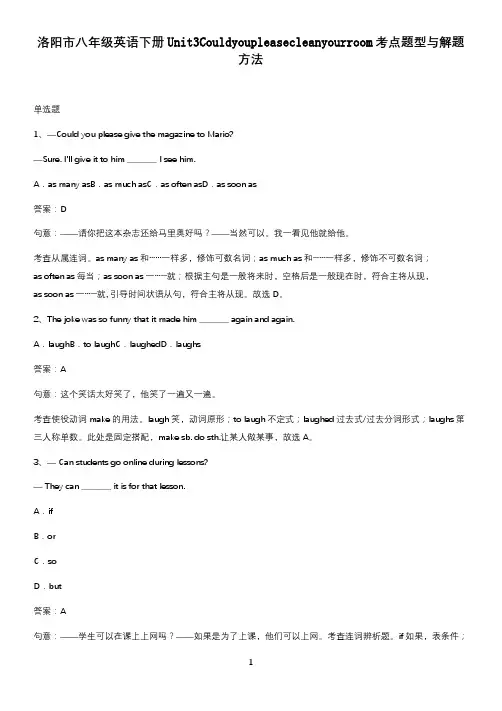
洛阳市八年级英语下册Unit3Couldyoupleasecleanyourroom考点题型与解题方法单选题1、—Could you please give the magazine to Mario?—Sure. I’ll give it to him ________ I see him.A.as many asB.as much asC.as often asD.as soon as答案:D句意:——请你把这本杂志还给马里奥好吗?——当然可以。
我一看见他就给他。
考查从属连词。
as many as和……一样多,修饰可数名词;as much as和……一样多,修饰不可数名词;as often as每当;as soon as一……就;根据主句是一般将来时,空格后是一般现在时,符合主将从现,as soon as一……就, 引导时间状语从句,符合主将从现。
故选D。
2、The joke was so funny that it made him ________ again and again.A.laughB.to laughC.laughedD.laughs答案:A句意:这个笑话太好笑了,他笑了一遍又一遍。
考查使役动词make的用法。
laugh笑,动词原形;to laugh不定式;laughed过去式/过去分词形式;laughs第三人称单数。
此处是固定搭配,make sb. do sth.让某人做某事,故选A。
3、— Can students go online during lessons?— They can ________ it is for that lesson.A.ifB.orC.soD.but答案:A句意:——学生可以在课上上网吗?——如果是为了上课,他们可以上网。
考查连词辨析题。
if如果,表条件;or或者,表选择;so所以,表结果;but但是,表转折。
答句是条件状语从句,需用if连接。
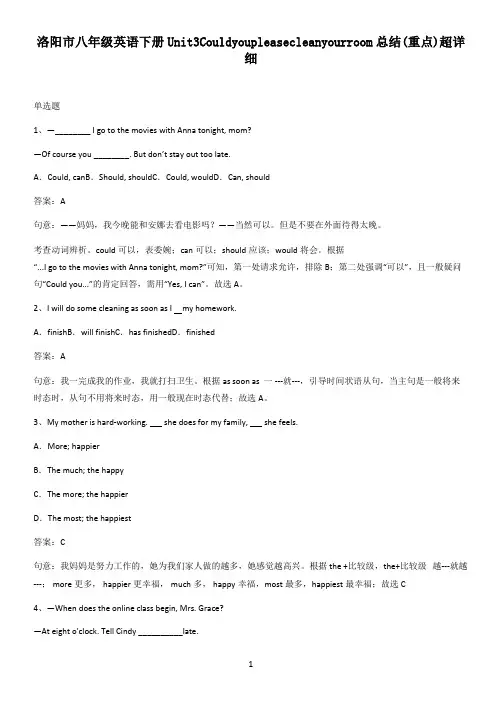
洛阳市八年级英语下册Unit3Couldyoupleasecleanyourroom总结(重点)超详细单选题1、—________ I go to the movies with Anna tonight, mom?—Of course you ________. But don’t stay out too late.A.Could, canB.Should, shouldC.Could, wouldD.Can, should答案:A句意:——妈妈,我今晚能和安娜去看电影吗?——当然可以。
但是不要在外面待得太晚。
考查动词辨析。
could可以,表委婉;can可以;should应该;would将会。
根据“...I go to the movies with Anna tonight, mom?”可知,第一处请求允许,排除B;第二处强调“可以”,且一般疑问句“Could you...”的肯定回答,需用“Yes, I can”。
故选A。
2、I will do some cleaning as soon as I my homework.A.finishB.will finishC.has finishedD.finished答案:A句意:我一完成我的作业,我就打扫卫生。
根据as soon as 一 ---就---,引导时间状语从句,当主句是一般将来时态时,从句不用将来时态,用一般现在时态代替;故选A。
3、My mother is hard-working. she does for my family, she feels.A.More; happierB.The much; the happyC.The more; the happierD.The most; the happiest答案:C句意:我妈妈是努力工作的,她为我们家人做的越多,她感觉越高兴。
根据 the +比较级,the+比较级越---就越---; more更多, happier更幸福, much多, happy幸福,most最多,happiest最幸福;故选C4、—When does the online class begin, Mrs. Grace?—At eight o'clock. Tell Cindy __________late.A.not beB.not beingC.not to be答案:C句意:——网上课程什么时候开始,Grace夫人?——8点钟。
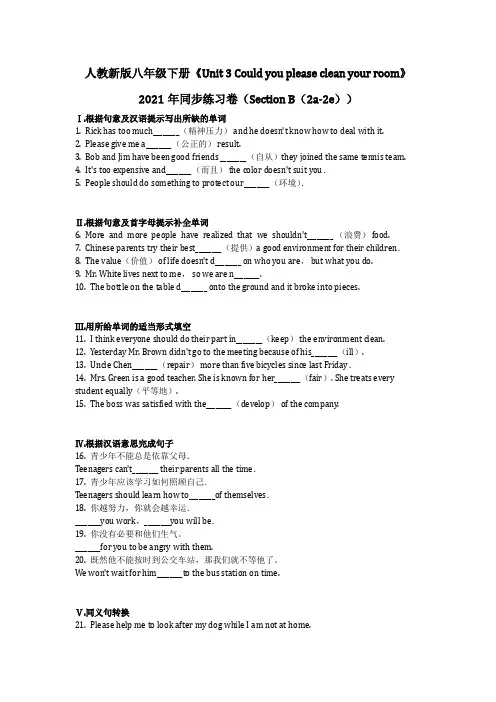
人教新版八年级下册《Unit 3 Could you please clean your room》2021年同步练习卷(Section B(2a-2e))Ⅰ.根据句意及汉语提示写出所缺的单词1. Rick has too much________(精神压力) and he doesn't know how to deal with it.2. Please give me a________(公正的) result.3. Bob and Jim have been good friends ________(自从)they joined the same tennis team.4. It's too expensive and________(而且) the color doesn't suit you.5. People should do something to protect our________(环境).Ⅱ.根据句意及首字母提示补全单词6. More and more people have realized that we shouldn't________ (浪费) food.7. Chinese parents try their best________(提供)a good environment for their children.8. The value(价值) of life doesn't d________ on who you are, but what you do.9. Mr. White lives next to me, so we are n________.10. The bottle on the table d________ onto the ground and it broke into pieces.Ⅲ.用所给单词的适当形式填空11. I think everyone should do their part in________(keep) the environment clean.12. Yesterday Mr. Brown didn't go to the meeting because of his________(ill).13. Uncle Chen________(repair) more than five bicycles since last Friday.14. Mrs. Green is a good teacher. She is known for her________(fair). She treats every student equally(平等地).15. The boss was satisfied with the________(develop) of the company.Ⅳ.根据汉语意思完成句子16. 青少年不能总是依靠父母.Teenagers can't________ their parents all the time.17. 青少年应该学习如何照顾自己.Teenagers should learn how to________of themselves.18. 你越努力,你就会越幸运.________you work,________you will be.19. 你没有必要和他们生气。
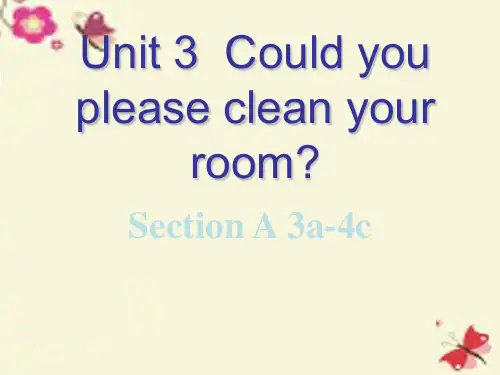
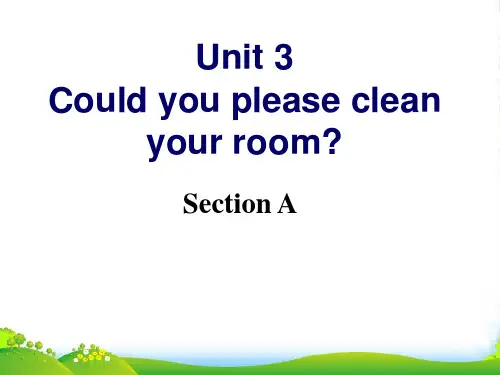
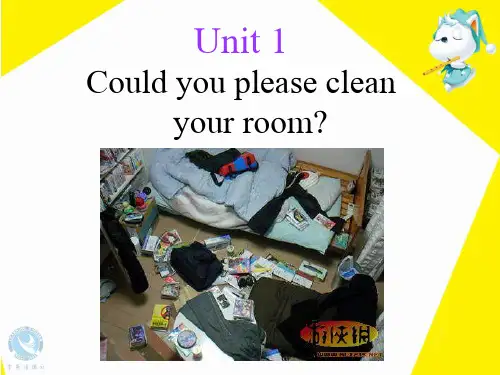
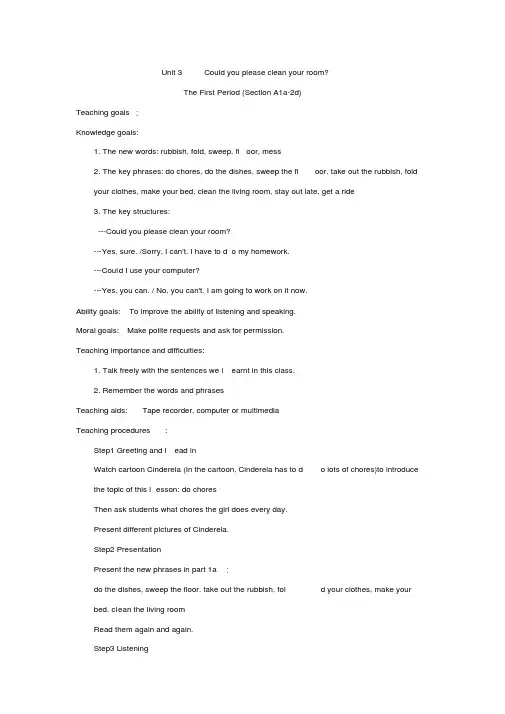
Unit 3 Could you please clean your room?The First Period (Section A1a-2d)Teaching goals:Knowledge goals:1. The new words: rubbish, fold, sweep, fl oor, mess2. The key phrases: do chores, do the dishes, sweep the fl oor, take out the rubbish, foldyour clothes, make your bed, clean the living room, stay out late, get a ride3. The key structures:---Could you please clean your room?---Yes, sure. /Sorry, I can't. I have to d o my homework.---Could I use your computer?---Yes, you can. / No, you can't. I am going to work on it now.Ability goals: To improve the ability of listening and speaking.Moral goals: Make polite requests and ask for permission.Teaching importance and difficulties:1. Talk freely with the sentences we l earnt in this class.2. Remember the words and phrasesTeaching aids: Tape recorder, computer or multimediaTeaching procedures :Step1 Greeting and l ead inWatch cartoon Cinderela (In the cartoon, Cinderela has to d o lots of chores)to introduce the topic of this l esson: do choresThen ask students what chores the girl does every day.Present different pictures of Cinderela.Step2 PresentationPresent the new phrases in part 1a:do the dishes, sweep the floor, take out the rubbish, fol d your clothes, make your bed, cl ean the living roomRead them again and again.Step3 ListeningT: Peter’s room is untidy, peter and his mother are at home, what shoul d they d o?chores or Mom’s chores?1. Now listen to the tape player, then finish part 1b. Peter’sListen it the first time, and check the answers2. Listen it again, then pay attention to the question:T: How does Mum ask peter to help her?----Could you please …?----Yes, sure. / Sorry, I can’t, I have to…Step 4 Pair workLook at the picture in 1a, ask your partner to d o the chores that you see.Example:A: Could you please sweep the fl oor?B: Yes, sure. Can you d o the dishes?ean the living room.A: Well, could you please do them? I ‘m going to clB: No problem.Step 5 Listening1. Look through the tasks in 2a and 2b carefully before listening.2. Play the tape the first time, let the students finish part 2a3. Play the tape the second time and let the stud ents finish the tasks 2b.4. Listen to the tape once more and ask the students to repeat after the tape and checkthe answers by themselves.Question: How to ask for permission?总结请求许可时,常用句型:---Could I…?---Yes, you can. / Sorry, you can’t.Step 6 Group workfather, Peter asks his father if he can do three Student A is Peter, Student B is Peter’smore t hings. Say “yes” or “no”, and give a reason. Such as:A: Could I use your computer?B: Sorry. I’m going to work on it now.A : Well, could I watch TV?B: Yes, you can. But first you have to clean your roomStep 7 Self-studyAsk the students to learn 2d by themselves and finish the tasks of self-study.1. Let students read the conversation loudly, then come up with some questions. Thestudent who raises a question will get 2 points. And the student who answers it will get1 point.2. Read it carefully, then find out the new words and difficult points. Let students showthem in class.3. Role-play the conversation in groups.Step 8 Language points1.Tony, could you please help out with a few things?help out (with something) 是一个动词短语, 表示在某人繁忙或是遇到困难时“给予帮助”。
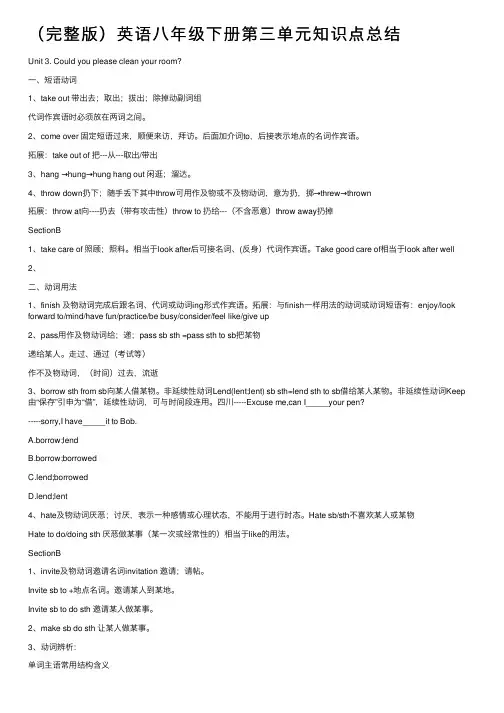
(完整版)英语⼋年级下册第三单元知识点总结Unit 3. Could you please clean your room?⼀、短语动词1、take out 带出去;取出;拔出;除掉动副词组代词作宾语时必须放在两词之间。
2、come over 固定短语过来,顺便来访,拜访。
后⾯加介词to,后接表⽰地点的名词作宾语。
拓展:take out of 把---从---取出/带出3、hang →hung→hung hang out 闲逛;溜达。
4、throw down扔下;随⼿丢下其中throw可⽤作及物或不及物动词,意为扔,掷→threw→thrown拓展:throw at向----扔去(带有攻击性)throw to 扔给---(不含恶意)throw away扔掉SectionB1、take care of 照顾;照料。
相当于look after后可接名词、(反⾝)代词作宾语。
Take good care of相当于look after well2、⼆、动词⽤法1、finish 及物动词完成后跟名词、代词或动词ing形式作宾语。
拓展:与finish⼀样⽤法的动词或动词短语有:enjoy/look forward to/mind/have fun/practice/be busy/consider/feel like/give up2、pass⽤作及物动词给;递;pass sb sth =pass sth to sb把某物递给某⼈。
⾛过、通过(考试等)作不及物动词,(时间)过去,流逝3、borrow sth from sb向某⼈借某物。
⾮延续性动词Lend(lent;lent) sb sth=lend sth to sb借给某⼈某物。
⾮延续性动词Keep 由“保存”引申为“借”,延续性动词,可与时间段连⽤。
四川-----Excuse me,can I_____your pen?-----sorry,I have_____it to Bob.A.borrow;lendB.borrow;borrowedC.lend;borrowedD.lend;lent4、hate及物动词厌恶;讨厌,表⽰⼀种感情或⼼理状态,不能⽤于进⾏时态。
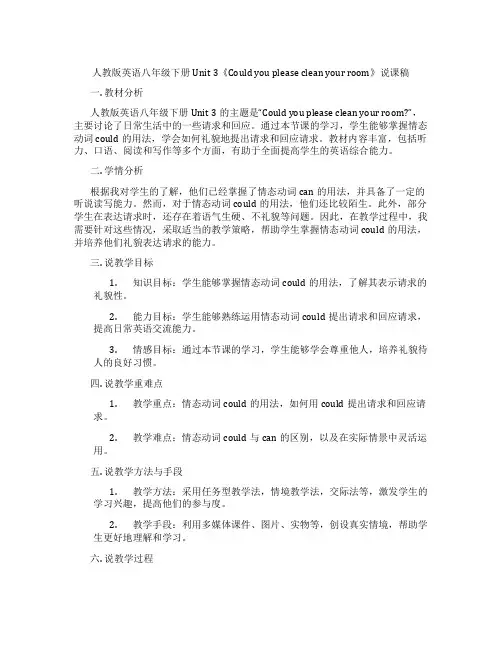
人教版英语八年级下册Unit 3《Could you please clean your room》说课稿一. 教材分析人教版英语八年级下册Unit 3的主题是“Could you please clean your room?”,主要讨论了日常生活中的一些请求和回应。
通过本节课的学习,学生能够掌握情态动词could的用法,学会如何礼貌地提出请求和回应请求。
教材内容丰富,包括听力、口语、阅读和写作等多个方面,有助于全面提高学生的英语综合能力。
二. 学情分析根据我对学生的了解,他们已经掌握了情态动词can的用法,并具备了一定的听说读写能力。
然而,对于情态动词could的用法,他们还比较陌生。
此外,部分学生在表达请求时,还存在着语气生硬、不礼貌等问题。
因此,在教学过程中,我需要针对这些情况,采取适当的教学策略,帮助学生掌握情态动词could的用法,并培养他们礼貌表达请求的能力。
三. 说教学目标1.知识目标:学生能够掌握情态动词could的用法,了解其表示请求的礼貌性。
2.能力目标:学生能够熟练运用情态动词could提出请求和回应请求,提高日常英语交流能力。
3.情感目标:通过本节课的学习,学生能够学会尊重他人,培养礼貌待人的良好习惯。
四. 说教学重难点1.教学重点:情态动词could的用法,如何用could提出请求和回应请求。
2.教学难点:情态动词could与can的区别,以及在实际情景中灵活运用。
五. 说教学方法与手段1.教学方法:采用任务型教学法,情境教学法,交际法等,激发学生的学习兴趣,提高他们的参与度。
2.教学手段:利用多媒体课件、图片、实物等,创设真实情境,帮助学生更好地理解和学习。
六. 说教学过程1.导入:通过播放一段关于孩子们日常生活的视频,引出本节课的主题“Could you please clean your room?”。
2.新课呈现:介绍情态动词could的用法,并通过例句展示如何用could提出请求和回应请求。
Unit 3 Could you please clean your room?The First Period (Section A1a-2d)Teaching goals:Knowledge goals:1. The new words: rubbish, fold, sweep, fl oor, mess2. The key phrases: do chores, do the dishes, sweep the fl oor, take out the rubbish, foldyour clothes, make your bed, clean the living room, stay out late, get a ride3. The key structures:---Could you please clean your room?---Yes, sure. /Sorry, I can't. I have to d o my homework.---Coul d I use your computer?---Yes, you can. / No, you can't. I am going to work on it now.Ability goals: To improve the ability of listening and speaking.Moral goals: Make polite requests and ask for permission.Teaching importance and difficulties:1. Talk freely with the sentences we l earnt in this class.2. Remember the words and phrasesTeaching aids: Tape recorder, computer or multimediaTeaching procedures :Step1 Greeting and l ead inWatch cartoon Cinderela (In the cartoon, Cinderela has to d o lots of chores)to introduce the topic of this l esson: do choresThen ask students what chores the girl does every day.Present different pictures of Cinderela.Step2 PresentationPresent the new phrases in part 1a:do the dishes, sweep the floor, take out the rubbish, fol d your clothes, make your bed, cl ean the living roomRead them again and again.Step3 ListeningT: Peter’s room is untidy, peter and his mother are at home, what shoul d they d o?1. Now listen to the tape player, then finish part 1b. Peter’s chores or Mom’s chores? Listen it the first time, and check the answers2. Listen it again, then pay attention to the question:T: How does Mum ask peter to help her?----Could you please …?----Yes, sure. / Sorry, I can’t, I have to…Step 4 Pair workLook at the picture in 1a, ask your partner to d o the chores that you see. Example:A: Coul d you please sweep the fl oor?B: Yes, sure. Can you d o the dishes?A: Well, coul d you please do them? I ‘m going to cl ean the living room.B: No problem.Step 5 Listening1. Look through the tasks in 2a and 2b carefully before listening.2. Play the tape the first time, let the students finish part 2a3. Play the tape the second time and let the stud ents finish the tasks 2b.4. Listen to the tape once more and ask the students to repeat after the tape and check the answers by themselves.Question: How to ask for permission?总结请求许可时,常用句型:---Coul d I…?---Yes, you can. / Sorry, you can’t.Step 6 Group workStudent A is Peter, Stud ent B is Peter’s father, Peter asks his father if he can do three more t hings. Say “yes” or “no”, and give a reason. Such as:A: Could I use your computer?B: Sorry. I’m going to work on it now.A : Well, coul d I watch TV?B: Yes, you can. But first you have to clean your roomStep 7 Self-studyAsk the students to learn 2d by themselves and finish the tasks of self-study.1. Let stud ents read the conversation l oudly, then come up with some questions. Thestudent who raises a question will get 2 points. And the student who answers it will get1 point.2. Read it carefully, then find out the new words and difficult points. Let students showthem in class.3. Role-play the conversation in groups.Step 8 Language points1.Tony, could you please help out with a few things?help out (with something) 是一个动词短语, 表示在某人繁忙或是遇到困难时“给予帮助”。
Unit3 知识点1. Could you please do sth ?请你(做)......好吗?Could用于提出请求,不是can的过去式,是委婉、礼貌的说法。
回答用can.2. 【短语】take out the trash 倒垃圾take a walk 散步take away 拿走/取走take back 收回take place 发生take off 脱下;起飞3. do the +名词:do the dishes/ laundry 洗餐具/衣服do the +doing: do the cleaning 打扫卫生do one’s + 名词: do one’s housework/ homework 做家务/家庭作业do some +doing: do some reading/ shopping 读写书/购物4. 表示时间、距离、金额、度量等词语作主语时,通常被视作整体,谓语动词用单数形式。
5. enough 修饰名词时,置于名词前/ ;修饰形容词、副词时,后置。
6. the minute = as soon as “一...... 就......”7. in front of指在物体外部的前面in the front of指在物体内部的前面8. come 短语:come over 过来come back 回来come up with想出come true实现come down下来come from=be from来自,出生于come in/into进入,进来come on赶快,加油come along走吧,过来,快点come and go来来去去come up上来come out出来,(花)开,(照片)冲洗出来9. all the time = always 一直;总是time 短语:on time 按时in time 及时at the same time同时the first time 第一次at times 有时last time上次next time 下次10. neither +助动词+主语“某人(主语)也不”neither …nor… 既不…也不…,做主语谓语动词符合就近原则。
Unit 3《Could you please clean your room》一、教材分析本单元的主要语言功能是礼貌地请求别人做某事和向他人请求允许做某事,语法项目是Could you please do…?和Could I do …?从教材的整合来说它是Can you do…?(表请求)和Can I do …?(请求许可)的延续,只是表达更委婉,更有礼貌。
从本单元来说,它既是本单元的基本语言内容,又为本单元知识扩展和综合语言运用奠定坚实的基础。
本单元话题又贴近他们的生活,应该会有话可讲,有话要讲。
二、重、难点知识点提示重点:让学生掌握词汇的运用以及用Could you please do…? Could I do…?两个句型提出请求和请求许可。
难点:本节课表示家务的动词词组较多,较难记忆和运用。
三、重点知识点讲解:考点(一)词语辨析Ⅰ. either/neither /none/ all/ both的用法。
either:1.否定句中的“也”。
如 A:I don't like music.B: Me either.(A说:我不喜欢音乐。
B说:我也是)2.两者其中之一。
如:A:Which would you like to drink,water or tea? B:Either of them is ok.(A说:你喜欢喝水还是茶?B:说哪种都行。
)neither:两者都不。
如:Neither of my parents has been to Baijing.(我父母两人都没去过北京)。
特殊句式:neither…nor… Neither you nor me am a doctor.(不论你还是我都不是医生)此结构中be的形式根据临近它的主语而定,即就近原则。
表达“……也不……” 则用“Neither /Nor + be / V助 / V情 + 主”—The first one wasn’t bad. — Neither was the second.both:两者都。
课题课时 1教学目标语言技能听:能听懂彼得母子就做家务的小对话。
说:能用情态动词could礼貌地提出请求,能礼貌地请求允许自己做某事并能得体地回答。
语言知识语音:正确拼读本节课的新单词,在朗读文本和进行对话时能模仿录音中的语音语调,口语交流时能做到语音、语调基本流畅,自然,正确。
词汇:1.理解:chore, rubbish, fold, make one’s bed, living room,;2.熟练运用:dish, sweep, meeting, do the dishes, take out, work on。
语法:初步学会使用情态动词could表达请求与请求许可的用法。
功能:能初步运用情态动词could表达请求与请求许可。
话题:用“Could you please...? Could I please...?”等谈论家务。
情感态度1.在谈论“Chores”这一话题中学习礼貌用语,体谅并理解他人的情感;使他们能理解父母,帮助分担家务,学会与他人沟通;2.通过运用礼貌语言的问答,使学生明白在日常生活中礼貌永远是正确的而且也是非常有必要的。
学习策略认知策略:能在具体的情境中用情态动词could正确表达请求和请求允许的话题,发现语言的规律,并能运用规律,从而进一步主动练习和实践,能够愉快地在用中学,在学中用,做到举一反三。
调控策略:把握学习的主要内容,通过自我评估,评价自己的学习效果,总结有效的学习方法。
交际策略:善于利用各种机会,以个性化的学习方式使用英语进行真实交际,在交际中遇到困难时,有效地需求帮助,并在交际中遵守英语交际的基本礼仪。
资源策略:通过多媒体、录音机等教学辅助工具,丰富自己的学习,进一步运用情态动词could进行正确的请求和请求允许话题的表达。
文化意识了解英语国家人们在行为举止、待人接物等方面与中国人的异同,进一步了解中外文化差异。
教学重难点教学重点could表示请求、允许的用法。
Unit 3 Could you please clean your room?教学目标:1语言目标:谈论做家务的词汇,及如何有礼貌的提出要求。
2 技能目标:能听懂和谈论做家务的话题;能写出重点单词和重点句型。
3 情感目标:培养学生爱劳动,分享家务的能力。
教学重点短语: do the dishes, make the bed, take out the rubbish, fold the clothes, sweep the floor, clean the living room ……句子:1. Could you please take out the rubbish?. Sure. / Sorry, I can’t. I have to finish homework first.2. Could I use your computer?Sorry. I'm going to work on it now.3. Well, could I watch TV?Yes, you can. But first you have to clean your room.教学难点:Make polite requestsAsk for permission课时划分:Period 1 Section A 1a – 2dPeriod 2 Section A 3a-3cPeriod 3 Section A Grammar focus-4cPeriod 4 Section B 1a-2ePeriod 5 Section B 3a-Self checkSection A1 (1a – 2d)Step 1 Warming-upSing the song and dance to the musicStep 2 Presentation1. W atch the photos and talk about them “W hat does he do every day?’ and learnthese phrases: do chores, do the dishes, make the bed, take out the rubbish, fold the clothes, do the laundry, clean the living room.2. Look these phrases and practice the conversation: Could you please take outthe rubbish? Sure. / Sorry, I can’t. I have to finish homework first.3. 1a Do you do these chores at home? Discuss them with your partner.Step 3 Listening1b Listen. Who will do these chores? Check (√) Peter’s mother or Peter.Step 4 Practice1c Make conversations about the chores in 1a.Make conversations.ExamplesA: Could you please...?B: Yes, sure. /All right. /No problem./Certainly.Sorry, I can't. I have to do...Sorry, I can't. I am doing...Step 5 Listening 2a&2bPeter asks his father if he can do four things. What does his father say? Check (√) “yes” or “no”. Listen again. Draw lines to the reasons.Step 6 Practice2c Make conversations using the information in 2a and 2bA: Could I use your computer?B: Sorry. I’m going to work on it now.A: Well, could I watch TV?B: Yes, you can. But first you have to clean your room?2d Role –play the conversationStep 7 Language points and summary1. Tony, could you please help out with a few things?help out 动词短语,表示在某人繁忙或遇到困难时“给予帮助”。
help和out之间还可以加入具体的“人”。
e.g. He helped me out with my task.他帮我完成了任务。
They helped (us) out with the clean-up.他们帮助我们做大扫除。
2. Could I at least finish watching this show?at least 至少e.g. We should brush our teeth at least twice a day.我们每天应该至少刷两次牙。
3. Yes, because Mom will be back from shopping any minute now.be back 回来e.g. I won't be back till 11:00.我11点以前回不来。
any minute now一种常见的口语表达法,相当于“随时;马上;在任何时刻”的意思,表示事情有可能在极短的时间内发生或眼下就要发生。
minute还可以用second, moment, time等词替换。
e.g. Don't worry, he will come here any minute now.别担心, 他会马上来这儿。
The guests are arriving any time now but we’re still not ready.客人即刻就到,但我们还没有准备好。
We’re expec ting them any moment now.我们期待他们随时到来。
Step 8 Summary1. New words and expressionsdo the dishes, sweep the floor, take out the trash, make the bed, fold the clothes, clean the room2. ---Could you please…?---Yes, please. / Sorry, I can’t.Step 8 Homework1 List all the main phrases of doing chores that you know. (必做)2 Make a conversation between you and your mother, using the sentence pattern “Could you please …?” (选做)Section A 2 (3a – 3c)Step 1 RevisionA: Could you please make sentences with these phrases in the past tense?B: Sure. I did some chores.take out the trash do choresdo the dishes sweep the floor make dinner make the bed fold the clothesclean the living room help out withat leastfinish doing sth.be back from shoppingsee this mess mother cleane.g. 1. A: Could you please......?B: Yes, sure./ All right./No problem./Certainly.Sorry, I can't. I have to do ...Sorry, I can't. I am doing ...2. A: What kind of chores did you do last weekend?B: I did the washes.Step 2 Reading3a Read the passage and answer the following questions.1. Did Nancy do any housework that day?2. Why was Nancy’s mom angry with Nancy?3. Did they solve the problem? How?3b. Read the story again and read the sentences below. Underline the sentences from the reading that mean the same thing.1. Neither of us did any housework for a week.2. My mom came over as soon as I sat down in front of the TV.3. You’re tired, but I’m tired, too.3c. Decide whether the underlined words in the sentences are verbs or nouns. Then write another sentence using the underlined word in the other form.1.Could you take the dog for a walk? (noun)2. Could I watch one show first?3. I can’t work all day.4. You watch TV all the time.5. “What happened?” she asked in surprise.Step 3 Language points1. You watch TV all the time and ...all the time(在该段时间内)一直;向来,一向;时时刻刻;每时每刻e.g. I do this all the time. 我一直是这么做的。